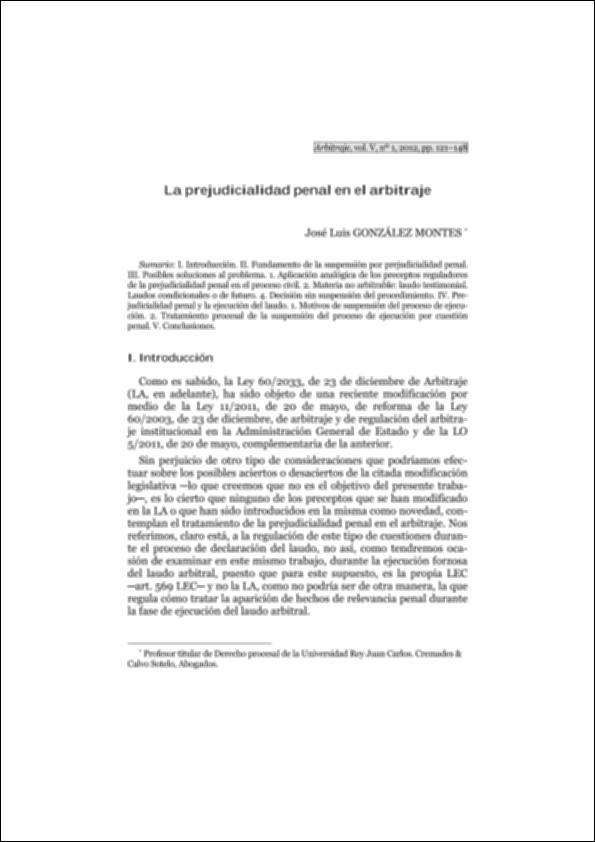Please use this identifier to cite or link to this item:
http://hdl.handle.net/10637/13063La prejudicialidad penal en el arbitraje
| Title: | La prejudicialidad penal en el arbitraje |
| Authors : | González Montes, José Luis |
| Keywords: | Prejudicialidad penal; Procedimiento; Suspensión; Ley Arbitraje 11/2011; Suspensión ejecución laudo; Criminal preliminary issues; Proceeding; Act 11/2011 Reform of the Arbitration Act; Suspension of the enforcement of the award |
| Abstract: | In the course of arbitration proceedings facts apparently criminal may
arise that, being materially relevant for deciding the arbitration, should be tried by a
competent criminal court forming a criminal preliminary issue in the arbitration proceedings. Law on Arbitration (LA) does not contain any provision regulating this kind of
matters and the opportunity to do it through the reform of the said LA as carried out by
Act 11/2011, of 20th May, has been missed. Consequently, new solutions should be proposed to solve a case of this kind as there concur in arbitration proceedings the same
grounds as in civil proceedings for the existence of criminal preliminary issues. The
main solution emerges from conceiving the occurrence of a criminal preliminary issue
in arbitration proceedings, and also in civil proceedings, as having an absolute restrictive character. Therefore, it is extremely exceptional evidencing the necessary conditions
for the existence of a criminal preliminary issue; secondly, in the event all the required
circumstances were met, we would resort to the analogical application of those provisions regulating criminal preliminary issues in civil proceedings (arts. 40 ss LEC and
art. 10.2 LOPJ) what would bring forward the stay of the arbitration proceedings and
the subsequent binding effect of the decision adopted within the criminal action; additionally, among others, the controversy may be decided upon but bearing in mind the
purportedly criminal underlying facts though without necessarily supplying them that
character. All of them present advantages and disadvantages that season the analysis of
this investigation concluding with the study of criminal preliminary issues at the stage
of the enforcement of the arbitration award where art. 569 LEC would be applicable
that establishes the suspension of the enforcement of the award when the criminal facts
determine the falsehood or the nullity of the enforceable title or the invalidity or unlawfulness of the decision of enforcement. Durante el desarrollo de un procedimiento arbitral pueden surgir hechos de apariencia delictiva que siendo relevantes para decidir la cuestión de fondo arbitral, deban ser conocidos por un órgano penal con competencia por razón de la materia constituyendo así una cuestión prejudicial penal en el arbitraje. La LA no contiene preceptos orientados a la regulación de este tipo de cuestiones y se ha desaprovechado la ocasión de incluirlos a través de la reforma de la LA por medio de la Ley 11/2011, de 20 de mayo. Así las cosas, el estudio aporta posibles soluciones que permitan resolver un supuesto de este tipo, pues concurre en el arbitraje el mismo fundamento para la constatación de una cuestión prejudicial penal que en el proceso civil. La solución principal viene de considerar que la posible concurrencia de una cuestión prejudicial en el arbitraje, pero también desde luego en el proceso civil, tiene carácter absolutamente restrictivo. Esto es, resulta un supuesto completamente excepcional el que concurran los presupuestos necesarios para la constatación de una cuestión prejudicial penal; como segunda posibilidad, para el caso en que se den todos los presupuestos requeridos, nos planteamos la aplicación analógica de los artículos reguladores de la prejudicialidad penal en el proceso civil al arbitraje (arts. 40 ss LEC y art. 10.2º LOPJ), lo que llevaría a la suspensión del arbitraje y a la espera de la resolución que se dictare en el ámbito penal con su posterior vinculación; también, entre otras, se puede optar por la decisión de la controversia pero teniendo en cuenta el sustrato fáctico presuntamente delictivo aunque sin la necesidad de darle esa calificación jurídico– penal. Todas ellas presentan ventajas e inconvenientes que aderezan el análisis de esta investigación que finaliza con el estudio de la prejudicialidad penal en sede de ejecución forzosa del laudo, donde será de aplicación el arts. 569 LEC que establece la suspensión de la ejecución cuando los hechos de relevancia penal determinen la falsedad o nulidad del título ejecutivo o la invalidez o ilicitud del despacho de la ejecución. |
| Description: | En: Arbitraje: revista de arbitraje comercial y de inversiones. eISSN. 2603-9281. vol. 5, n. 1, 2012, pp 121-148 |
| URI: | http://hdl.handle.net/10637/13063 |
| Rights : | http://creativecommons.org/licenses/by-nc-nd/4.0/deed.es |
| Issue Date: | 1-Apr-2012 |
| Appears in Collections: | 2012 Arbitraje nº 1 |
Items in DSpace are protected by copyright, with all rights reserved, unless otherwise indicated.


